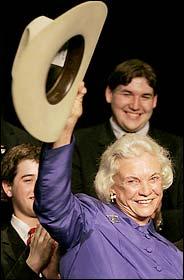:: 25 ::
The Decemberists | “The Infanta” | Picaresque
Band site: http://www.decemberists.com
Buy Picaresque
:: 24 ::
The New Pornographers | “Sing Me Spanish Techno” | Twin Cinema
Who even knows what A.C. Newman is talking about? Who cares? This band has yet to make a bad record, and “Spanish Techno” is proof that the band has taken its quirky demeanor and pure pop sensibilities and given the whole shebang a posture tweak. The drums’ promotion to the front of the mix and the brash guitar attack-hooks make this track ripe for repetition.
Buy Twin Cinema
:: 23 ::
Rogue Wave | “Salesman at the Day of the Parade” | Descended Like Vultures
Among its compatriots in the Top Thirty, this is the song newest to the Toaster library -- which typically means the Toaster will come to regret ranking it so highly. The staff was blindsided by how naturally this one catches the ear. Not to mention how simple the song feels despite its lush guitar layering and the intricate movement in the melody. Well played, Rogue Wave.
Buy Descended Like Vultures
:: 22 ::
Kathleen Edwards | “What Are You Waiting For?” | Back to Me
Let’s be honest. When we filed Back to Me on the shelf back in July, we may have been a little disappointed in Kathleen Edwards’ follow-up to our beloved Failer. And we still may be, however unfairly. But, giving the disc a second try as we compiled the year-end list, and having finally put our expectations aside, this Canadienne reminded us just how she can devastate her listener and tear down her subject with one turn of phrase. Or how her voice can seem to sneer and soar at the same time. Still, we miss the intimacy sacrificed in bringing a full band aboard.
Buy Back to Me
:: 21 ::
Iron and Wine | “Freedom Hangs Like Heaven” | Woman King
Band site: http://www.ironandwine.com
Buy Woman King








